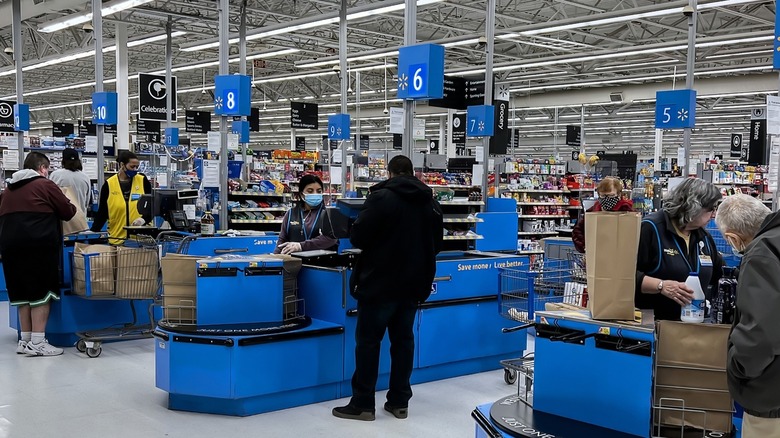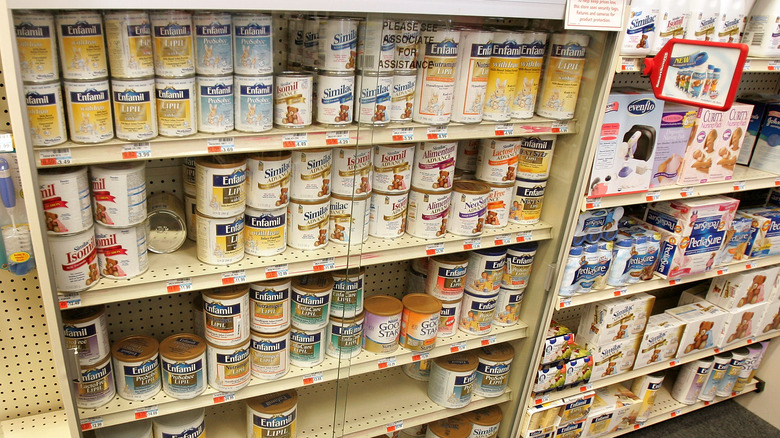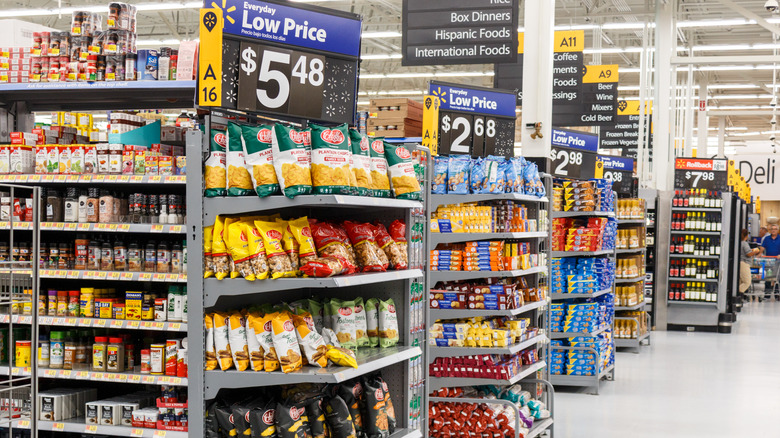Walmart's CEO Claims Prices Could Increase Because Of Theft
Shoplifting is a natural part of running a business, unfortunately. Retailers know this and account for shrinkage in their planning and security measures (via Shopify). However, an increase in shoplifting at big box stores is threatening one retailer's pricing for customers.
Walmart has been tight-lipped about the exact dollar amount lost to theft, but CEO Doug McMillon did admit in an interview with CNBC that, "it's higher than what it has historically been." Walmart's competitor, Target, has seen about a 50% increase in shoplifting leading to upwards of $400 million in losses just this fiscal year. While it is true that opportunistic theft from individuals and employees alike continues to be a problem, the bulk of shoplifting losses is coming from organized retail crime, per CNBC. These groups systematically steal and resell the products they have taken. If effective changes are not made, McMillon warns of higher prices and store closures.
The consequences for consumers are already becoming obvious. A report from Los Angeles Times found that Walmart stores in the metropolitan area had actually partitioned small areas of the pharmacy and cosmetic sections. In order to purchase these items, customers had to pay a specific cashier before exiting the designated area to continue their shopping in the rest of the store. Other items, such as men's underwear, were locked behind plexiglass, and customers had to wait for a store associate to allow them access to the case (per LA Times).
Economic pressure is increasing shoplifting
Measures grocery stores are taking to prevent crime include tracking repeat shoplifters, plain-clothed Loss Prevention Associates, and cameras at self-checkout stations (via Algrim). However, these methods are all reactionary. With inflation on the rise, consumers are simply feeling strained. According to CNBC, customers are avoiding full-priced items, selecting the store brand over a name brand, and are buying far less non-essential merchandise. In an interview with Yahoo! Finance, Walmart CFO John David Rainey recognized the "challenging macro environment" and noted "trade downs into less expensive proteins ... like beans and peanut butter and hot dogs from higher priced meats."
Additionally, the 2022 Retail Security Survey from the National Retail Federation (NRF) found that businesses are still suffering the ramifications of increased theft due to food and economic insecurity during the COVID-19 pandemic (via The Washington Post). Labor shortages, challenges around hiring, and employee retention are making it difficult to staff enough employees to keep stores well monitored.
When it comes to organized retail crime, retailers saw an increase of about 26.5%, per NRF. Offenders are looking for items that are easy to conceal with a significant resale value like apparel, footwear, electronics, accessories, office supplies, and cosmetics. Other commonly stolen items reflect the struggles of the current economic climate, such as medication, meat, and children's items like infant formula. In response, grocery stores are adapting new packaging to prevent shoplifting by putting security tags on commonly stolen items.
Walmart's brand perception is an asset
Walmart CEO Doug McMillon sees strong partnerships with local law enforcement as a significant part of the solution and says consistent legislation from policymakers would be helpful (via CNBC). The New York Post reports that retailers and law enforcement alike see the increased felony threshold that many states have passed as a main reason for the rise in shoplifting. Laura Cooper of the Major Cities Chiefs Association said, "Without deterrents and accountability, communities will be victimized, and businesses terrorized."
Community activists, however, are troubled by the steps retailers are taking. In an interview with Los Angeles Times, activist Najee Ali says, "Latino and African American neighborhoods have been racially profiled to have extra security measures in the stores that I believe aren't even warranted." Indeed, it appeared that stores in wealthier neighborhoods were locking up fewer commonly stolen items despite high property crime rates.
As complex as socioeconomic conditions leading to shrinkage are, McMillan says that strategies to curb retail theft will vary across cities and locations, per CNBC. Because Walmart appeals to budget-conscious shoppers, they appear poised to weather the storm. They showed a 9% increase in sales in its third quarter, largely as a result of consumers across various income levels shopping at the big box retailer (via CNBC). With relief from inflation pressure nowhere near, CFO John David Rainey tells Yahoo! News that the chain hopes strategic promotions and pricing can pull it through the holiday season.


